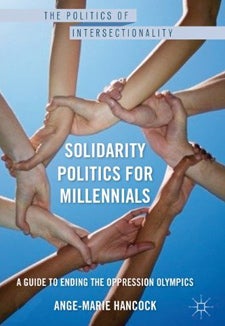Rotary-Dial Politics in an iPhone World
Picture this scene from an episode of the NBC sitcom 30 Rock: Two characters Tracy Jordan and Jenna Maroney face off, both of them fuming. Tracy, a black male, is wearing a woman’s wig and a hot pink blazer, his face powdered white, and Maroney, a white woman, is in a man’s suit, her face covered in brown makeup. Their bosses Liz Lemon and Jack Donaghy demand an explanation.
Tracy: Jenna and I are doing a social experiment.
Jenna: We’re trying to prove who has it harder in America, women or black men.
The characters’ swap of racial and gender roles perfectly exemplifies the Oppression Olympics, an evocative term for the competition between race, gender or class groups as they vie for the title of the most victimized in politics.
As a political scientist, Ange-Marie Hancock has worked with students and activists from the Millennial Generation for more than 15 years on issues of social justice and liberty. When the conversation turns to the Oppression Olympics, the inevitable question comes up: How can everyone get beyond their differences and find solidarity for political progress?
Hancock, associate professor of political science and gender studies in USC Dornsife, presents a solution in her recently published book Solidarity Politics for Millennials: A Guide to Ending the Oppression Olympics (Palgrave MacMillan).

Ange-Marie Hancock provides a blueprint for political progress in her new book, Solidarity Politics for Millennials: A Guide to Ending the Oppression Olympics.
On the whole, millennials are more politically tolerant toward issues of race, gender and sexual orientation than previous generations, Hancock notes. However, until now, these American teens and 20-somethings making the passage into adulthood have lacked a new analytical framework in which to approach political conversation.
“It really became clear to me over the past five years, and looking at the 2008 election, that millennials were very much engaged in political conversations with their parents and grandparents who are Generation Xers or Baby Boomers. But there weren’t a lot of changes in the kind and quality of those conversations,” Hancock said.
In Solidarity Politics for Millennials, she provides a blueprint for political progress with intersectionality, a theoretical framework that looks at the intersections of race, gender, class and sexuality politics and their impact on public policy.
“Intersectionality is actually an antidote to the Oppression Olympics,” said Hancock, a globally recognized scholar on the theory. “It refocuses the way we talk about ourselves, how we talk about group interactions and the ways in which political institutions function in American society. It updates us from the 1970s, rotary-dial-types of politics and moves us more toward iPhone and Blackberry politics.”
The book is a “how-to” guide, bringing together analytical theory with pop culture in an action plan that encourages solidarity for people of all ages and backgrounds. Hancock explores the complexities of 21st century global politics; the dilemmas that exist for individuals, groups and public policy; and practices necessary for deep political solidarity. Approaches are examined in the context of political issues and events such as the 2008 election, immigration and Proposition 8, a ballot initiative in California that banned same-sex marriages in the state.
Each chapter concludes with suggestions for additional sources to bridge the gap between generations: Web sites to visit, YouTube clips to play, television shows to watch. The episode of 30 Rock where Tracy Jordan and Jenna Maroney pit their differences against each other is offered as a way to invite discussion on the “ridiculous logic” of the Oppression Olympics.
Hancock said she deliberately wrote the book so it could easily be used by a broad audience.
“Rather than being very technical and only applied to scholars, I’m really trying to foster a conversation between academics, policy practitioners and activists around the world,” she said.

Ange-Marie Hancock is associate professor of political science and gender studies in USC Dornsife. Photo by Denise Winters.
For instance, with the current worldwide Occupy protests, which cut across all groups, Hancock offers intersectionality as a potential method for focusing the movement with a collective message.
“Right now, what we see with Occupy Wall Street is that virtually everyone involved — whether they’re on Wall Street, in Los Angeles or in another country — is that they are coming to the movement from any number of political issues.
“Intersectionality really helps us think about what would be the common policy agendas that could be put into place that would address what’s going on right now,” she said.
Hancock, who is associate director of the Center for the Study of Immigrant Integration in USC Dornsife, has served as an international expert in American politics for the U.S. Department of State. She also worked for the National Basketball Association where she conducted the preliminary research and wrote the original business plan for the Women’s National Basketball Association.
Solidarity Politics for Millennials is the first book in the series “The Politics of Intersectionality,” which Hancock is co-editing with British sociologist Nira Yuval-Davis. Forthcoming titles will look at faith and activism, and ways that intersectionality has been implemented in the European Union and around the world.
With the inaugural volume, Hancock hopes to engage millennials with a meaningful new framework for political progress. “In order to have an informed opinion, it helps to have a different analytical framework instead of simply being cued unknowingly into thinking through the Oppression Olympics.”